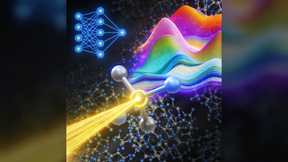Antimicrobial resistance on the International Space Station
 (Download Image)
(Download Image)
The International Space Station, a unique microgravity research laboratory in low-Earth orbit.
In an effort to minimize antimicrobial resistance (AMR) threat to astronauts, who may be immunocompromised and thus at a greater risk of infection from pathogens, a comprehensive study of the International Space Station “resistome” was conducted by a team of scientists from the Jet Propulsion Laboratory, LLNL, the Naval Medical Research Center, and AlloSource. Using a variety of molecular methods, the team catalogued the AMR genes for the first time directly from the ISS environmental samples without culturing. The AMR gene profiling could lead to mitigation strategies to maintain astronaut health during long-duration space missions when return to Earth for treatment is not possible. LLNL team members include Crystal Jaing (BBTD) and Jonathan Allen.
[C. Urbaniak, A. Checinska Sielaff, K.G. Frey, J.E. Allen, N. Singh, C. Jaing, K. Wheeler, and K. Venkateswaran, Detection of antimicrobial resistance genes associated with the International Space Station environmental surfaces, Scientific Reports 8, 814 (2018), doi: 10.1038/s41598-017-18506-4.]
Tags
Bioscience and BioengineeringBiosciences and Biotechnology
Physical and Life Sciences
Featured Articles







